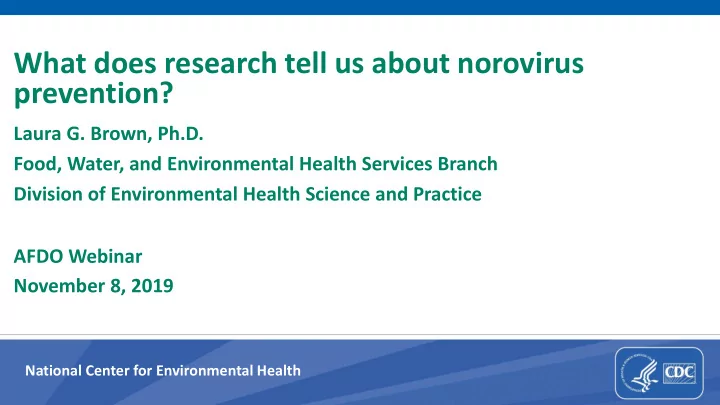

What does research tell us about norovirus prevention? Laura G. Brown, Ph.D. Food, Water, and Environmental Health Services Branch Division of Environmental Health Science and Practice AFDO Webinar November 8, 2019 National Center for Environmental Health
Contamination by suspected ill workers is a major contributor to foodborne norovirus outbreaks 70% 2
Key to norovirus prevention: keep ill workers from working Food workers should stay home from work when sick with vomiting or diarrhea 1 in 5 food workers say they have worked with vomiting or diarrhea 3
Key to norovirus prevention: good hand hygiene Food workers should wash Food workers should avoid touching their hands properly ready-to-eat foods with their bare hands Food workers practice proper Workers had bare hand contact handwashing 1 in 4 times that they with ready-to-eat food in 1 in 3 should restaurants 4
Key to norovirus prevention: cleaning and sanitizing Food contact surfaces should be properly cleaned and sanitized Contaminated equipment was observed in 2 out of 3 restaurants 5
How to improve practices related to norovirus prevention?
FOOD SAFETY MANAGEMENT SYSTEMS
Food safety management system (FSMS) Procedures A set of actions adopted by management minimizes food safety risks Training Teaching employees food safety procedures Monitoring Routine measurements to determine if food safety procedures are being followed 8
Food safety management system ratings and out- of-compliance food safety practices 5.8 4.5 2.1 1.7 No FSMS Strong FSMS No FSMS Strong FSMS Fast food restaurants Full service restaurants 9
Links between procedures and food safety → Written slicer cleaning policy Slicers cleaned more frequently Staffing plans for absent workers → Workers less likely to work while ill Policy requiring workers to tell managers when they are ill → Policy or schedule for cleaning Smaller outbreaks 10
Links between procedures and average norovirus outbreak size 15.2 13.0 10.1 Restaurant has no Restaurant has verbal Restaurant has written cleaning policy cleaning policy cleaning policy 11
Links between training and certification and food safety Fewer critical violations on → Certified kitchen manager inspections Food worker food safety More likely to have correct sanitizer → training solution concentration Food worker food safety Workers more likely to wash hands → training when needed Food worker food safety → Smaller outbreaks training 12
Links between training and average norovirus outbreak size 15.2 13.0 11.2 9.6 Restaurant does not Restaurant provides Restaurant provides Restaurant provides provide training on-the-job training classroom training on-the-job and classroom training 13
Links between monitoring and food safety Food workers actively monitor → Foods more likely to cool within cooling food temperatures recommended timeframe Workers record food → Lower odds of an outbreak temperature temperatures 14
REGULATIONS 15
Regulations and food safety Fewer ▪ Prohibiting bare-hand contact → norovirus ▪ Requiring a certified kitchen outbreaks manager 16
What can food officials do? ▪ Focus prevention efforts on • Preventing ill workers • Good hand hygiene • Cleaning and sanitizing ▪ Support strong food safety management systems in restaurants • Procedures • Training and certification • Monitoring ▪ Adopt and enforce food safety regulations 17
Thank you Laura G. Brown Email: lrg0@cdc.gov For more information, contact NCEH 1-800-CDC-INFO (232-4636) TTY: 1-888-232-6348 www.cdc.gov Follow us on Twitter @CDCEnvironment The findings and conclusions in this report are those of the authors and do not necessarily represent the official position of the Centers for Disease Control and Prevention.
Recommend
More recommend